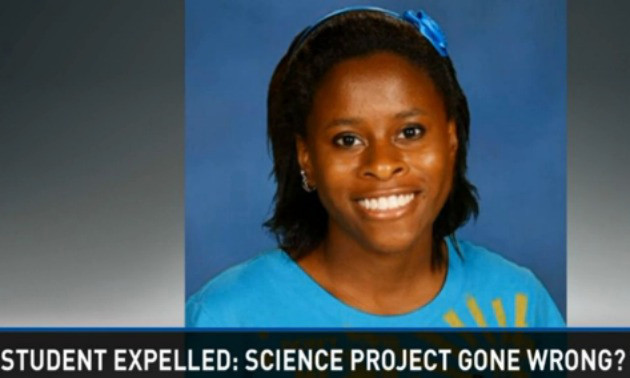Kiera Wilmot Expelled: Scientists, Teachers Outraged By Harsh Punishment For Teen's Experiment Accident

Scientists are tweeting and blogging in indignation in response to the story of a Florida teenager expelled from school and facing felony charges for a science experiment gone awry.
Last week, before classes began, 16-year-old Kiera Wilmot put toilet cleaner and aluminum foil inside a plastic bottle -- to see what would happen when the chemicals combined, she says. The resulting explosion attracted a police officer, but harmed no one. Still, the Polk County School District, citing its code of conduct, immediately expelled her. Wilmot was also arrested and will be tried as an adult for allegedly possessing and discharging a weapon on school grounds and discharging a destructive device, according to the Miami New Times.
Ken Roy, the director of environmental health and safety for the school district of Glastonbury, Conn., a safety adviser for the National Science Teachers Association, and a former science teacher himself, was taken aback by the harsh punishment.
“Couldn’t this be a really good learning experience?” he said in a phone interview.
If Wilmot was his student, Roy said the most discipline he might advocate for – based on what’s been reported about the case -- is a few days of in-school suspension, combined with some parent conferences and lectures on safety. It’s important for kids to know that even household chemicals can be dangerous when mixed together, Roy says.
In Wilmot’s case “there does not seem to me to be criminal intent,” he says. “Arrest for a felony would seem to be somewhat extreme.”
Other scientists and science educators said the school’s overreaction was a symptom of an education system that discourages students to be creative outside the classroom. Biologist DNLee trashed the officials’ decisions in a blog post for Scientific American.
“I can’t name a single scientist or engineer, who hadn’t blown up, ripped apart, disassembled something at home or otherwise cause a big ruckus at school all in the name of curiosity, myself included,” DNLee wrote. “Science is not clean. It is very messy and it is riddled with mistakes and mishaps.”
Many scientists, responding to a call from deep-sea biologist Andrew Thaler, tweeted examples of their own scientific experiments gone awry in their teenage years.
“I accidentally pulled out a lit bunsen hose from the tap,” U.K. scientist Terry Harvey-Chadwic tweeted. “Made a jet of flame cross the class. Never seen kids move so fast.”
Chemist Ashutosh Jogalekar blasted school and state officials for the overreach in another post for Scientific American. The case of Kiera Wilmot, Jogalekar said, is one more example of how draconian security concerns sacrifice scientific curiosity on the altar of discipline. Hands-on science is becoming discouraged by fearful parents and liability-shy schools.
“Absurdly named 'chemical free' chemistry sets are already depriving students of the joy of chemistry,” Jogalekar wrote on Wednesday. “When I was growing up my chemistry set had a lot of potentially harmful chemicals like copper sulfate and potassium ferricyanide. On every bottle there were clear labels advising us of the hazards of that particular chemical, antidotes against poisoning and the phone number of the poison center. None of these labels deterred me or my parents, and the set opened up the wonderful world of chemistry to me.”
Many commentators have also noted a possible racial bias element in the case (Wilmot is African-American).
Florida Assistant State Attorney Tammy Glotfelty, according to the police report in the Wilmot case, advised the arresting officer to file charges for possessing and discharging weapons on school property. That same week, Glotfelty’s office declined to press charges against a Taylor Richardson, a 13-year-old boy that shot and killed his 10-year-old brother with a BB gun, ruling the incident “a tragic accident.” Based on Facebook photos, the Richardson family appears to be white.
© Copyright IBTimes 2024. All rights reserved.





















